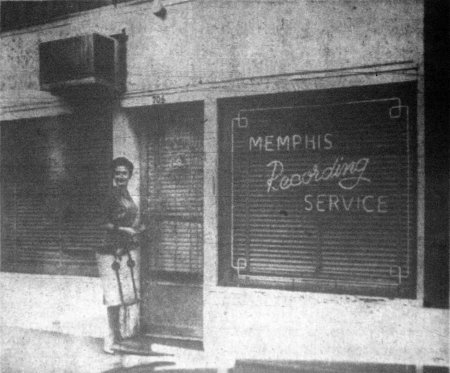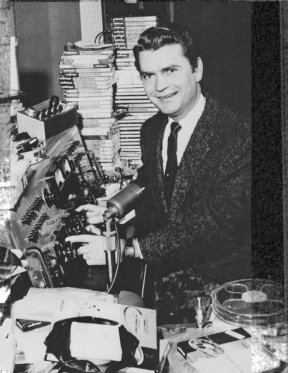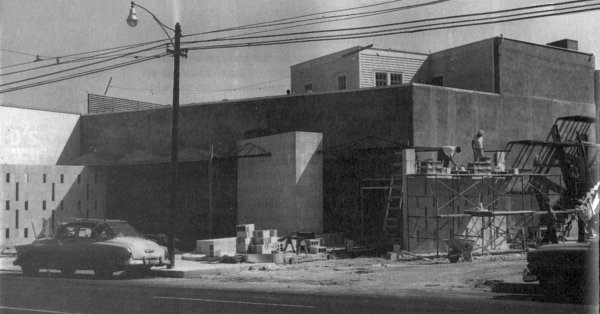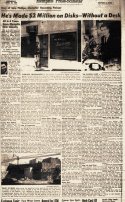|
Story of Sam Phillips, Memphis Recording Pioneer
He's Made $2 Million on Disks -
Without a Desk
|

Press-Scimitar Staff Photo by Tom Barber
|

Press-Scimitar Staff Photo by Ken Ross
|
| THEE-DESK HEADQUARTERS of Sam PHILLIPS' 11-corporation empire is this unprepossessing studio at 706 Union, at Marshall. Entering the building is Regina Reese, one of the four women employees who, Phillips says, run the business. Asked what she had in her king-sized handbag, which is only slightly smaller than the office she works in, Regina cracked: "I'm starting my own
company." |
THE GUIDING HAND of Memphis' first and most successful recording company is that of
Sam C. Phillips, who - tho he doesn't have a desk - still takes a seat at the control panel for a recording session at his studio now and then. Phillips was a WREC engineer when he started his business.
|
All in 6 Years: Gave Memphis New Industry
This is the third and final article about one of Memphis' newest and fastest-growing industries - the recording business - by
Edwin Howard, Press Scimitar amusements editor, who gave an inside view of the business while making a record himself. The Phillips International recording - "Forty-Leven Times" b-w "More Pretty Girls Than One" went into national release this week.
By EDWIN HOWARD
Press-Scimitar Amusements Editor
Behind the dusty, bent Venetian blinds in a three desk office at 706 Union stands the man who in six years had
brought a brand-new industry to Memphis, and helped make Memphis a leader in that industry.
The man is Sam C. Phillips.
The office is identified only by a small neon sign in the window which says Memphis Recording Service.
The man stands because, altho he has made roughly $2 million for himself in those six years, he has no desk at which to sit down.
"If I have a real long telephone call, tho," he admits, "I will ask somebody to get up and let me sit down."
Even without a desk, Phillips somehow manages to run 11 corporations from the building at 706
Union, which consists of a tiny reception room (two desks), a studio which doubles as a mailing room, a control room with attached half-bath, a promotions office (one desk), and a storage room.
Keystone of the vest-pocket empire is Sun Record Company, which started Elvis Presley, Carl Perkins, Jerry Lee Lewis and Johnny Cash on
their way to fame and fortune, and made Memphis the Rock and Roll capital of the world. The same little studio is the home of Phillips International Records, which introduced Bill Justis and a million-selling record called "Raunchy" to the world.
Swanky New Offices
One day within the next two months, however, Sun and Phillips International and related firms will be moving to swanky new studios nearby. "Because we ran out of corners for corporations," Phillips has luxurious new offices and the last word in recording facilities under construction at 639 Madison.
The new studios, which will be available for use by other companies as well as used for Sun and Phillips International
releases, should be ready by summer, Phillips said. He is personally supervising the construction and the installation of electronic equipment, while at the same time tending to his oil interests in Illinois, his zinc and lead mines in Arkansas, and his other financial interests, including the Holiday Inns stock, the Memphis all-girl radio station, WHER, and the new all-girl station, WLIZ, which he is opening in Lake worth, Fla., adjoining Palm Beach and West Palm Beach.
The Phillipses live at 79 S. Mendenhall - Sam, his wife Becky, and their two sons, Knox and Jerry, for whom two of his music publishing companies are named. (There are five publishing companies in all, the others being
Hi-Lo, Jack Clement Music, and Justis Music: Jack Clement and Bill Justis are partners in the last two.)
Some have wondered why Phillips never dressed up the studio at 706 Union or hung out a sign identifying it as the Sun Record Company. After all, it has been five years since Sun began its swift rise in the record firmament, and three years since it reached its apex.
Phillips has several reasons:
|

HOWARD |
'Out of Proportion'
"I don't know. I just felt like if I put up a big sign on this little building, or tried to fancy it up, it would look all out of proportion. There's something about that little Memphis Recording Service sign that just goes with it. As for a desk for myself, well,
I'm not the kind that runs things by bangin' on a desk, so I didn't figure I needed one.
"Anyhow, I've got four girls and a man at three desks we do have that know how to handle all the desk work" Sally Wilburn, Barbara Barnes, Regina Reese, Kay Keisker, and Sales Manager Cecil Scaife. Everyone around here has a smattering of knowledge of the whole business. And I've got no secrets. Plenty of times, I've talked thousands of dollars worth of business with 10 or 12 people squeezed into the same room doing different things. Allegiances and enthusiasm are what gives us our efficiency.
"And our informality is what gives us hit records. Our artists get the feeling we're just goofin' around. as I tell 'em, there's no sense being nervous, because there's nobody else here that can do any better."
Sam himself makes no bones about being a country boy. He was born on a farm near Florence, Ala. In the evenings on the farm and later in town, an old negro who worked for the family, Uncle
Silas Payne, would pull Sam onto his knee and sing to him.
'Uncle Silas's' Songs
Little Sam's favorite song - both rhythmical and funny - was about a trip to Africa where "they got battercake trees, and right next to them sausage trees. We gonna pick us some of those fluffy battercakes an' some of those juicy sausages an' go down to Molasses River an' have ourselves a time"
"Uncle Silas lived with us from the time I was 12 till I was 17," Sam recalls, "and practically raised me. He'd tell me those fantastic stories and sing me those funny songs, and man it just fascinated me!"
Sam never outgrew his fascination with the rhythms and nonsense of the negro, altho other musical styles crowded it out for a while.
at 17, he went to work for a Muscle Shoals radio station as engineer-announcer, then moved to WLAC in Nashville,
where he learned to appreciate the soc-called hillbilly form of folk music. in 1945, he moved to Memphis and an engineering job with WREC.
"I used to handle those Peabody band feeds (to the CBS network) and man! did I get tired of listening to the same old arrangements over and over."
In order to hear and share with others - some of the many different kinds of music he liked, Sam persuaded the station management to let him have his own record program on Saturday afternoons - the Saturday Afternoon Tea Dance show which Fred Cook has continued. Sam not only played music, he talked about it avidly and articulately and
developed a large, faithful following.
Started Recording
At the end of 1949, while still working for WREC, Sam started putting some of his strong musical tastes into practice. in his spare time, he cut so-called Rhythm and Blues records in Memphis, leasing the master tapes to some of the independent record companies which were springing up in other cities, such as Chess, RPM, and Modern. among the Memphis negro artists he helped start on their way were Bee Bee King, Roscoe Gordon, Little Junior Parker, Jackie Brenston, and Rocket 88.
"It got so you could sell a half-million copies of a Rhythm and Blues record," Sam said. "These records appealed to white youngsters just as Uncle Silas' songs and stories appeal to me. To city-born white children who had never had an Uncle Silas, it was something new, and it became their nonsense - like fairly tales.
"But there was something in many of these youngsters that resisted buying this kind of music. the southern ones, especially, felt a resistance that even they probably didn't quite understand. they liked the music, but they weren't sure whether they ought to like it or not.
"so I got to thinking how many records you could sell if you could find white performers who could play and sing in this same exciting, alive way."
As the whole world knows, he found them.
Came Elvis
In January of 1953, he started his own Sun Record Co., giving Memphis the first of its present 14 record labels. a few months later, a young truck driver came in to use the Memphis Recording Service facilities to make a record for his mother's birthday. He sounded so distinctive that Sam wrote down his name and address and kept an ear out for material for him to record for Sun. Early in the summer of 1954,
Elvis Presley - and Sun Records - were on their way with a disc called 'That's All Right, Mama" b/w "Blue Moon of Kentucky."
Elvis was first classified as a hillbilly - or country music, as the phrase had become -
artist. He guested on the Louisiana Hayride and Grand Ole Opry shows. But he was not the conventional country-music type singer. Marion Keisker, who constituted Phillips' office staff ten, called him "a hillbilly cat."
What his style really stemmed from was a mingling of negro music with country music. Eventually this new kind of music evolved itself into basically country-music sentiments sung to negro and rhythm tunes.
One reason Memphis became the capital of this music, which came to be called Rock and Roll, was that Nashville, already a recording center, snubbed it.
"They not only snubbed it," declares Phillips. "They fought it. With the Grand Ole Opry there, they were committed to country music. They didn't think Rock and Roll would last, and they did all they could to kill it. Finally, of course, they realized they couldn't lick it, so they joined it. The old established Grand Ole Opry stars got so they couldn't draw the crowds anymore unless they had
rock and roll artists with them. Eventually, the Opry's two top executives resigned and went into the Rock and Roll publishing business. But in the meantime, Memphis had become the Rock and Roll recording capital of the world. Even tho Nashville has come around, we're still neck and neck with them as the country's fourth or fifth biggest recording center in actual number of sessions held."
|

Press-Scimitar Staff Photo |
| PLENTY OF DESKS, office space, two recording studios, each its own control room, and an acetate mastering room will be included in the new Sun Record Co., now nearing
completion at 639 Madison. Front, designed by Denise Howard of Decor by Denise, is of rough textured terrazzo. Top floor will include penthouse executive offices and a sun and dance deck. Unlike old offices (top of page), the new building will be identified as home of Sun and Phillips International records by a sign and oversized, multi-colored disks. |
Why He Sold Elvis
The question most often asked Phillips is, doesn't he regret selling Elvis Presley's contract?
"Never," he says firmly. "Selling that contract gave us the capital we desperately needed at the time for expansion. The record business isn't like any other branch of show business. You can borrow money to produce a movie or a play, but not a record. The record business is so precarious, you can't get financial backing until you don't need it.
"I had gotten a lot of offers for Elvis' contract, but I had turned them all down till I learned RCA was interested. I asked them just twice what I thought they'd pay - about - $40,000 - for the contract and all the masters.
"To understand why I have never regretted the decision, you have to remember something. At that time, most of the experts thought
Elvis was a flash-in-the-pan. Even RCA wasn't sure they had made a good deal. We had Carl Perkins' 'Blue Suede Shoes' just out then, and RCA wondered for several months if they had bought the wrong contract.
"Of course, the sale turned out to be tremendous for RCA, and it gave us what we needed then - proof that we weren't one shot flukes, financing for expansion, and good credit. A total pressing bill of $150,000 at our three pressing plants (in Memphis, Los Angeles and Philadelphia)
isn't unusual, so you've got to have good credit."
Rock 'n' Roll Not Dead
Is Rock and Roll on its way out?
"No," says Phillips. "The kids got tired of some of the 'typical' Rock and Roll, but I think they've shown they don't want any big change. We're keeping the flavor and
modifying the beat and the lyrics a little. Yet you still have one of those wild 'Stagger Lee' type of things every now and then. No, Rock and Roll isn't dead. We'll feel its influence for a long time to come."
Is Sun committed to this kind of music?
"Not exclusively, no. The reason we're building the new studio is to make more EPs (extended Play) and LPs (Long Play), a better grade of pop, and to get into stereo, which is just getting started good. We'll continue rock and Roll, but we're broadening
our scope. We have to consider the fact that 60 percent of the record business is now in EPs and LPs. To get into this end of the business, our outlay will be more and our return slower, but at the
same time we'll be stabilizing our product.
"I believe the record business is still in its embryonic stage. It will continue to grow and develop, and with our new studios we expect to grow and develop along with it.
"A lot of people thought we were thru after Elvis. We came up with Carl Perkins. They thought we were finished when we had some bad luck and began to fade. We came up with Jerry Lee Lewis. Then
Bill Justis. And altho Johnny Cash is no longer with us, we're still bringing out new singles by him and we have two LP albums and three EPs that are consistent top sellers.
"If people don't realize it by now, let me say it one more time:
"We're in this business to stay."

Article by Edwin Howard - April 29, 1959
Memphis Press-Scimitar courtesy
Michael Rose
and KingRoseArchives.com
Portion of photo of Sam Phillips by Ken Burns courtesy Colin Escott
source 706unionavenue.nl
Press-Scimitar Photo of Studio courtesy Colin Escott's Good
Rockin'
Tonight
article added May 31, 2013
This article is reprinted exactly as it appeared in the
April 29th 1959 edition of the Memphis Press-Scimitar for posterity.
See also the 1st and 2nd
of this series and the studio page on Sam Phillips
Recording Service.
|






